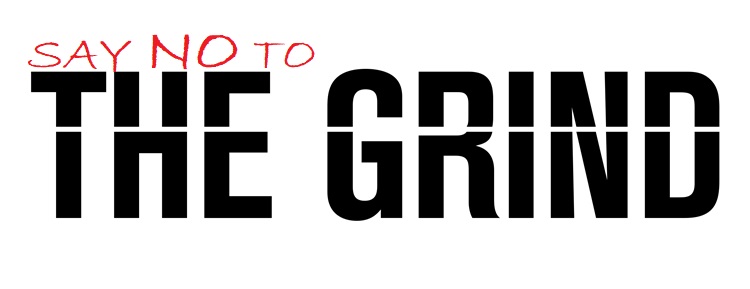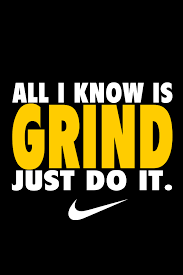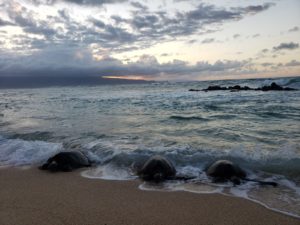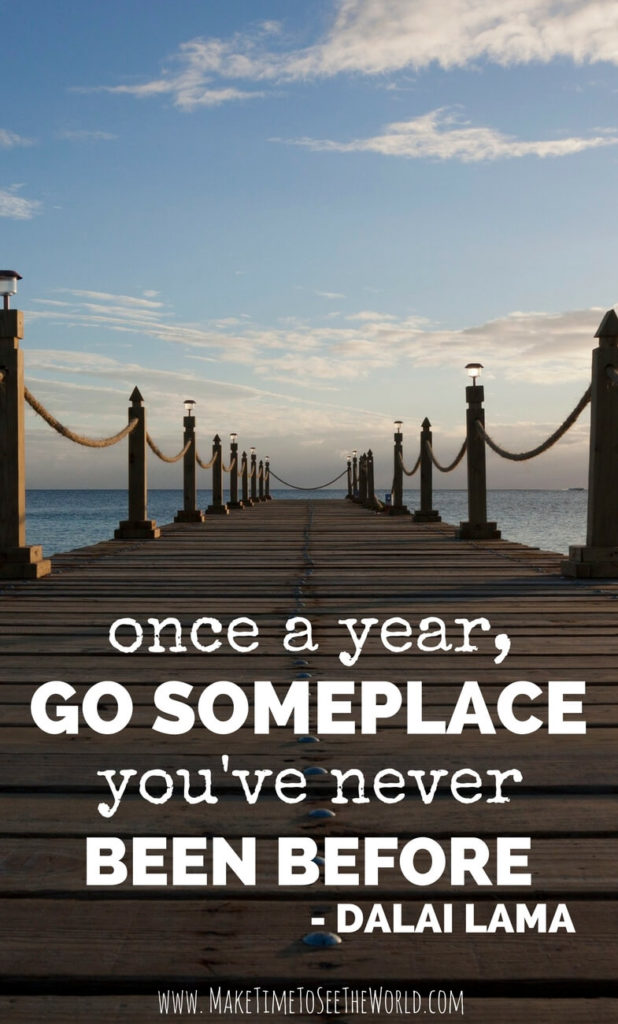

I just got back from a vacation to the chillest American state. We Canadians beat many cool temperature records but Hawaiians are the truly cool ones! Judging by the number of burnouts I see daily in my practice, there’s something to be said about our lifestyles and current perceived “normals” -wanting the next, newest, biggest, best, more advanced ___ ___(fill in your own blanks). Just take a look at this ad glorifying “the grind”. When I googled the word “grind”, looking for images for this post, I got pictures of a meat/coffee grinder, power tools, and mortar & pestle.
___(fill in your own blanks). Just take a look at this ad glorifying “the grind”. When I googled the word “grind”, looking for images for this post, I got pictures of a meat/coffee grinder, power tools, and mortar & pestle.
How long do you think you can put your body through this “grind” before there’s nothing left of you?
We worry that we might fall behind, not realizing we may just be running on a hamster wheel not really going anywhere. I’m not advocating for us all to become beach bums -not that there’s anything wrong with that- however, a more balanced lifestyle would entail the following:
1. a mindful prioritizing of our time, including time spent acquiring knowledge
2. a mindful spending of money
3. a mindful spending of energy -a limited resource
It may be time to question some of your decisions regarding your spending of these resources -especially if you’ve reached burn-out!
But here are some of my thoughts, what research shows and what one renowned psychologist/philosopher of our time has to say on the subject:
1. My priority is to spend as much of my free Time with family and in nature; and to combine those two is just heavenly! Living in the age of information technology, it also becomes essential to really pick and choose what sources of information you choose to tune-in to and how much time you spend doing so. Do you gather your news from TV stations, facebook and instagram? And how much of your time is spent in this passive spoon feeding of ‘knowledge’? It’s a daily struggle but perhaps setting aside a few minutes a day to read something inspirational/positive/spiritual or follow your passion to learn a new craft or a new science in an active manner may be a better way of spending time acquiring knowledge as a means of feeding your soul.
2. Money can either buy a physical item or something non-tangible (a service, a course, an experience, etc.). How we choose to spend this resource can either lessen stress or be of very little value in the grand scheme of things. Research after research is now proving that buying yourself services and experiences that free up mental energy and are a source of joy is the best way to spend your money. Eg. In one study participants were given $400 with one group told to purchase whatever they wanted and the 2nd group asked to purchase a service (let’s say paying for catering for a party or a once a week cleaning service). The study found that the participants that had spent those $400 on a service were much happier than those that had spent that money for a product purchase. In our fast paced world, freeing up time and gifting yourself with positive joyful experiences is truly priceless! This would be in contrast to spending money to keep up with fast fashion (which is also serving as a severe detriment to our environment) and the latest gadgets, and so on. This is of course a very personal choice but it is important to make these decisions mindfully and not fall prey to the ‘societal norms’ of our times.
3. Many of us falsely believe that we have an unlimited supply of Energy and as long as we keep pushing ourselves (that glorified grind), we are doing well! Sadly however, this very false notion is the leading cause of what is known as Adrenal Insufficiency. Patients as young as 22 years of age are now coming to me presenting with these symptoms. It would be understandable when/if a major life stressor (loss, divorce, move, etc) is the cause of burnout but when burnout is a result of our day to day chosen lifestyle of ‘grind’, it becomes essential that we make the necessary adjustments to prevent a complete collapse. You have a limited resource in terms of Vital Energy or Essence and once that’s been depleted, it is very difficult to fully recover it. Dr. Jordan Peterson explains one of the causes of this so wide-spread problem in his book “12 Rules for Life”. He believes that in our age of technology and world-wide connectedness, where we are no longer that one teacher, coach, mechanic, chef (or however you identify yourself) in town, we are now one among thousands and millions of others and so our sense of self suffers, causing an exponential rise in dissatisfaction with ourselves, always expecting more of ourselves and wanting more for our lives. 
He says:
“We are always and simultaneously at point “a” (which is less desirable than it could be), moving towards point “b” (which we deem better, in accordance with our explicit and implicit values). We always encounter the world in a state of insufficiency and seek its correction. We can imagine new ways that things could be set right, and improved, even if we have everything we thought we needed. Even when satisfied, temporarily, we remain curious. We live within a framework that defines the present as eternally lacking and the future as eternally better. If we did not see things this way, we would not act at all. We wouldn’t even be able to see, because to see we must focus, and to focus we must pick one thing above all else on which to focus.
But we can see. We can even see things that aren’t there. We can envision new ways that things could be better. We can construct new, hypothetical worlds, where problems we weren’t even aware of can now show themselves and be addressed. The advantages of this are obvious: we can change the world so that the intolerable state of the present can be rectified in the future. The disadvantage to all this foresight and creativity is chronic unease and discomfort. Because we always contrast what is with what could be, we have to aim at what could be. But we can aim too high. Or too low. Or too chaotically. So we fail and live in disappointment, even when we appear to others to be living well. How can we benefit from our imaginativeness, our ability to improve the future, without continually denigrating our current, insufficiently successful and worthless lives?
The first step, perhaps, is to take stock.”
With our natural human state of dissatisfaction with what is, and the added knowledge of the success, achievements, lifestyle, etc. of the top 1% of the world in each field, there’s been an exponential growth in dissatisfaction in us all. That may also be why recent psychological studies point to the significant role of the practice of gratitude for our mental/emotional well-being. So take stock of all that you do have and bring yourself fairly to account with regards to how high or low or chaotically you may be aiming. And identify how you may adjust and correct that.
It has been mind boggling for me to note that almost 90% of my patients above 25 years old (myself included to some degree) suffer from varying degrees of stress-related illnesses! And seeing the CONTRAST in Hawaii was my inspiration to do a re-analysis of my own life-goals and priorities. I hope this has given you some inspiration for change and if it hasn’t, go travel! Anywhere! And not to a resort. I challenge you to spend a week among the locals, rent a vacation home, eat the food the locals eat and make friends with the locals! You won’t regret it. Perhaps on your return, you’ll come back with fresh eyes . . .
“The real voyage of discovery consists not in seeking new landscapes, but in having new eyes” – Marcel Proust. T

Yours in Health,
Dr. Negin Misaghi, ND


